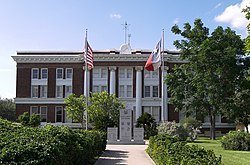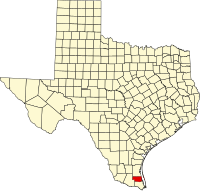Willacy County, Texas
| Willacy County, Texas | |
|---|---|
| County | |
| Willacy County | |

The Willacy County Courthouse in Raymondville
|
|
 Location in the U.S. state of Texas |
|
 Texas's location in the U.S. |
|
| Founded | 1912 |
| Named for | John G. Willacy |
| Seat | Raymondville |
| Largest city | Raymondville |
| Area | |
| • Total | 784 sq mi (2,031 km2) |
| • Land | 591 sq mi (1,531 km2) |
| • Water | 194 sq mi (502 km2), 25% |
| Population | |
| • (2010) | 22,134 |
| • Density | 37/sq mi (14/km²) |
| Congressional district | 34th |
| Time zone | Central: UTC-6/-5 |
| Website | www |
Willacy County is a county located in the U.S. state of Texas. As of the 2010 census, its population was 22,134. Its county seat is Raymondville. The county was created in 1911 and organized the next year.
Willacy County comprises the Raymondville, TX Micropolitan Statistical Area, which is included in the Brownsville–Harlingen–Raymondville, TX Combined Statistical Area.
Willacy County was formed in 1911 from parts of Cameron and Hidalgo counties and originally included what is now Kenedy County; it was named for state senator John G. Willacy. Kenedy was split from Willacy in 1921, when the long-settled ranchers of the northern (Kenedy) part of the county sought to separate from the newly arrived farmers of the southern part.
The Bermuda onion was introduced to Willacy County in 1912. It grew well and slowly displaced ranchland in the southern part of the county, becoming the most important crop. For many years the town of Raymondville held an annual Onion Festival, using the tag line, "The Breath of a Nation." In 1940, the first oil wells were sunk in the county's Willamar Oil Field; today oil production is a major part of the local economy, although increasingly eclipsed by natural gas. Also in the 1940s, sorghum was introduced to the county, gradually displacing cotton and other crops. Cattle ranching remains a substantial economic activity as well.
According to the U.S. Census Bureau, the county has a total area of 784 square miles (2,030 km2), of which 591 square miles (1,530 km2) is land and 194 square miles (500 km2) (25%) is water. It borders the Gulf of Mexico.
...
Wikipedia
